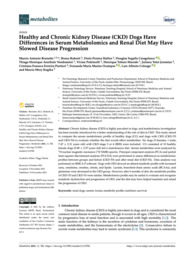Healthy and Chronic Kidney Disease (CKD) dogs have differences in serum metabolomics and renal diet may have slowed disease progression.
Healthy and Chronic Kidney Disease (CKD) dogs have differences in serum metabolomics and renal diet may have slowed disease progression.
Author(s): BRUNETTO, M. A.; RUBERTI, B.; HALFEN, D. P.; CARAGELASCO, D. S.; VENDRAMINI, T. H. A.; PEDRINELLI, V.; MACEDO, H. T.; JEREMIAS, J. T.; PONTIERI, C. F. F.; OCAMPOS, F. M. M.; COLNAGO, L. A.; KOGIKA, M. M.
Summary: ABSTRACT: Chronic kidney disease (CKD) is highly prevalent in dogs, and metabolomics investigation has been recently introduced for a better understanding of the role of diet in CKD. This study aimed to compare the serum metabolomic profile of healthy dogs (CG) and dogs with CKD (CKD-T0 and CKD-T6) to evaluate whether the diet would affect metabolites. Six dogs (5 females; 1 male; 7.47 ± 2.31 years old) with CKD stage 3 or 4 (IRIS) were included. CG consisted of 10 healthy female dogs (5.89 ± 2.57 years old) fed a maintenance diet. Serum metabolites were analyzed by 1H nuclear magnetic resonance (1H NMR) spectra. Principal component analysis (PCA) and partial least squares discriminant analysis (PLS-DA) were performed to assess differences in metabolomic profiles between groups and before (CKD-T0) and after renal diet (CKD-T6). Data analysis was performed on SIMCA-P software. Dogs with CKD showed an altered metabolic profile with increased urea, creatinine, creatine, citrate, and lipids. Lactate, branched-chain amino acids (BCAAs), and glutamine were decreased in the CKD group. However, after 6 months of diet, the metabolite profiles of CKD-T0 and CKD-T6 were similar. Metabolomics profile may be useful to evaluate and recognize metabolic dysfunction and progression of CKD, and the diet may have helped maintain and retard the progression of CKD.
Publication year: 2021
Types of publication: Journal article
Unit: Embrapa Instrumentation
Keywords: Animal nutrition, Metabolic profile, Renal dogs, Survival, Uremic toxins
Observation
Some of Embrapa's publications are published as ePub files. To read them, use or download one of the following free software options to your computer or mobile device. Android: Google Play Books; IOS: iBooks; Windows and Linux: Calibre.
Access other publications
Access the Agricultural Research Database (BDPA) to consult Embrapa's full library collection and records.
Visit Embrapa Bookstore to purchase books and other publications sold by Embrapa.

